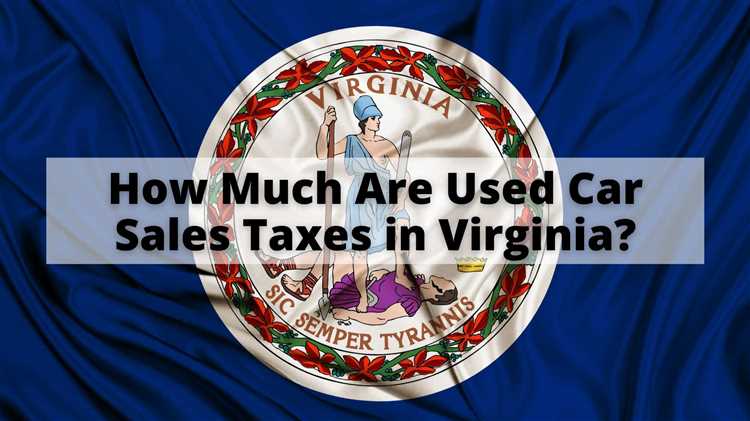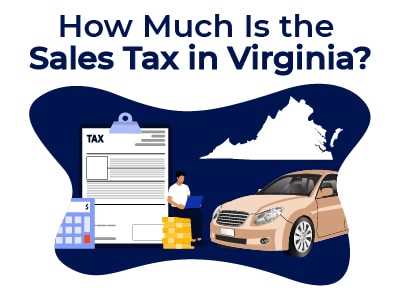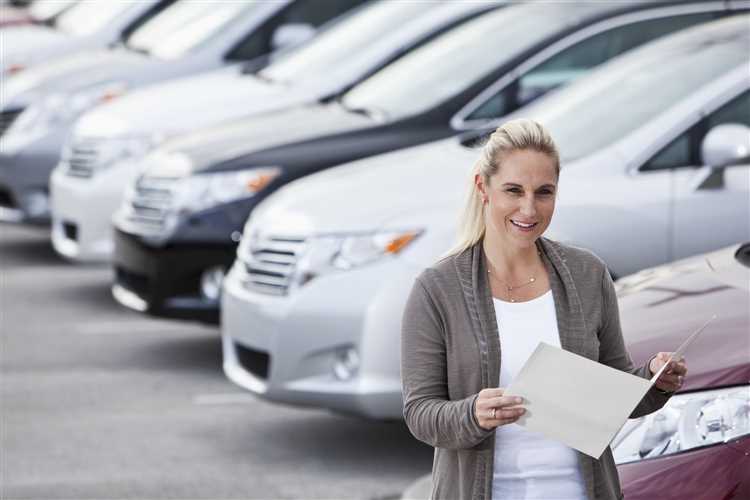
When it comes to owning a car in Virginia, one important aspect that all residents must consider is the car tax. Unlike many other states, Virginia has a unique system in place for assessing and collecting taxes on vehicles. Understanding this system is crucial to avoid any surprises and ensure compliance with the law.
The car tax in Virginia is an annual tax that is levied on personal property, which includes vehicles. The amount of tax you owe is based on the value of your car as of January 1st of each year. The local county or city where you live is responsible for assessing the value of your car and determining the tax rate. It is important to note that the car tax is separate from the registration fees and other fees associated with owning a car.
One thing that sets Virginia apart from other states is that the car tax is billed in arrears. This means that you are actually paying the tax for the previous year. For example, the car tax bill you receive in 2022 is for the tax year of 2021. This can sometimes lead to confusion for new residents or people who have recently purchased a car in Virginia.
It is also worth noting that certain exemptions and discounts are available for some individuals. For example, active-duty military personnel and disabled veterans may be eligible for a reduced car tax rate. Additionally, there are exemptions for certain vehicles, such as farm vehicles and low-speed vehicles. It is important to check with your local county or city government to see if you qualify for any of these exemptions or discounts.
- Understanding Virginia Car Tax
- Calculation of the Virginia Car Tax
- Payment of the Virginia Car Tax
- Uses of the Virginia Car Tax
- What Is Virginia Car Tax?
- How Is Car Tax Assessed?
- How Is Car Tax Collected?
- Who Should Pay Virginia Car Tax?
- Residents of Virginia
- Non-Residents with Vehicles Registered in Virginia
- Exemptions
- How Is Virginia Car Tax Calculated?
- Fair Market Value
- Local Personal Property Tax Rate
- When Is Virginia Car Tax Due?
- How Can I Pay Virginia Car Tax?
- What Happens If I Don’t Pay Virginia Car Tax on Time?
- 1. Late Payment Penalties
- 2. Interest Charges
- 3. Collection Actions
- 4. Suspension of Vehicle Registration
- Q&A,
- What is the Virginia car tax?
- How is the Virginia car tax calculated?
- Who is responsible for paying the Virginia car tax?
- Are there any exemptions or discounts for the Virginia car tax?
- What happens if I don’t pay the Virginia car tax?
- What is the car tax in Virginia?
Understanding Virginia Car Tax
The Virginia car tax is a state tax imposed on individuals who own a motor vehicle that is registered in the state of Virginia. It is an annual tax, which means that it must be paid every year by car owners in Virginia.
Calculation of the Virginia Car Tax
The amount of the Virginia car tax is based on the value of the vehicle as determined by the Department of Motor Vehicles (DMV) and the tax rate set by the local government. The DMV uses a standard pricing guide to determine the value of each vehicle, taking into account factors such as the make, model, year, and condition of the vehicle. The tax rate varies by locality and can range from 1% to 5% of the assessed value of the vehicle.
Payment of the Virginia Car Tax

The Virginia car tax is usually due at the same time as the vehicle registration renewal. Car owners can pay the tax online, by mail, or in person at their local DMV office. Failure to pay the tax on time can result in late fees and penalties.
Some car owners may be eligible for tax exemptions or reduced tax rates. For example, active-duty military members who are stationed in Virginia but are not permanent residents of the state may be exempt from the car tax. Additionally, certain vehicles, such as government-owned vehicles, may be exempt from the tax altogether.
Uses of the Virginia Car Tax
The revenue generated from the Virginia car tax is used to fund various local government services, including schools, public transportation, and road maintenance. The tax helps to support the infrastructure and services that benefit the residents of Virginia.
It is important for car owners in Virginia to understand the requirements and obligations related to the car tax. By staying informed and paying the tax on time, individuals can ensure that they are contributing to the funding of essential services in their community.
Overall, the Virginia car tax is an annual tax imposed on vehicle owners in the state. It is based on the value of the vehicle and the tax rate set by the local government. Car owners must pay the tax each year and failure to do so can result in penalties. Understanding the calculation, payment options, and uses of the car tax is important for all car owners in Virginia.
What Is Virginia Car Tax?
The Virginia car tax is a tax imposed on motor vehicles owned and registered in the state of Virginia. It is an annual tax that is based on the assessed value of the vehicle and is collected by local county or city governments. The car tax is used to fund various local government services and projects, such as schools, libraries, and public works.
The amount of car tax you have to pay in Virginia is determined by the assessed value of your vehicle. The assessed value is usually a percentage of the vehicle’s retail value, as determined by the Virginia Department of Motor Vehicles (DMV) or other designated assessors. The exact percentage varies depending on the age and type of vehicle, and it is subject to change annually.
How Is Car Tax Assessed?
To determine the assessed value of your vehicle, the Virginia Department of Motor Vehicles or other designated assessors consider factors such as the vehicle’s make, model, age, mileage, condition, and any modifications or upgrades. They may also take into account the current market value of similar vehicles in the area.
Once the assessed value is determined, it is multiplied by the car tax rate set by the local county or city government to calculate the annual tax amount. Some localities may have different tax rates for personal-use vehicles and business-use vehicles.
How Is Car Tax Collected?
The car tax is collected by the local county or city government where the vehicle is registered. The tax payment is usually due annually and can be paid in one lump sum or divided into installments, depending on the local government’s policies.
| Vehicle Type | Assessment Percentage |
|---|---|
| Passenger Vehicles | 100% |
| Motorcycles | 80% |
| Commercial Vehicles | 90% |
| Trailers | 100% |
Who Should Pay Virginia Car Tax?
Anyone who owns a vehicle that is registered in Virginia is responsible for paying the Virginia car tax. This tax is assessed annually and is based on the assessed value of the vehicle.
Residents of Virginia
If you are a resident of Virginia and own a car, you are required to pay the car tax. This applies to both individuals and businesses.
Non-Residents with Vehicles Registered in Virginia
Even if you are not a resident of Virginia but have a vehicle that is registered in the state, you are still obligated to pay the Virginia car tax. This includes students, military personnel, and individuals who temporarily reside in Virginia but have registered their vehicle in the state.
It’s important to note that if you move out of Virginia but still have a vehicle that is registered in the state, you may still be liable for paying the car tax until you change your registration to another state.
Exemptions
Some individuals may be eligible for exemptions or reductions in the Virginia car tax. These include certain disabled veterans, active-duty military personnel, and vehicles owned by certain non-profit organizations. It’s recommended to check with the Virginia Department of Motor Vehicles or a tax professional to determine if you qualify for any exemptions.
Overall, it is essential to understand that if you own a vehicle registered in Virginia, you are responsible for paying the Virginia car tax unless you qualify for an exemption.
How Is Virginia Car Tax Calculated?
In Virginia, the car tax, also known as the motor vehicle tax, is calculated based on the value of the vehicle. The calculation process involves several factors, including the vehicle’s purchase price, age, and locality.
To determine the taxable amount, the Virginia Department of Motor Vehicles (DMV) uses the vehicle’s purchase price as a starting point. This includes any trade-in value or rebates applied to the purchase. However, some adjustments may be made depending on the vehicle’s age and condition.
Fair Market Value
The taxable value is adjusted based on the fair market value (FMV) of the vehicle. The FMV is the approximate amount that the vehicle would sell for on the open market. The DMV considers factors such as the mileage, condition, and any aftermarket modifications when determining the FMV.
It is important to note that the vehicle’s FMV may not necessarily match the purchase price. If the FMV is higher than the purchase price, the tax will be based on the higher value. Conversely, if the FMV is lower, the tax will be based on the lower value.
Local Personal Property Tax Rate
Additionally, the car tax rate varies depending on the locality in Virginia. Each county and city sets its own personal property tax rate, which is applied to the taxable value of the vehicle. It is important to check with the local government to determine the specific tax rate for your area.
In some cases, local governments may offer tax exemptions or reductions for certain individuals, such as senior citizens or disabled veterans. These exemptions can provide significant savings on the car tax. It is advisable to contact the local government or DMV to inquire about any available exemptions.
Once the taxable value and tax rate have been determined, the car tax amount can be calculated by multiplying the taxable value by the tax rate. The resulting amount is the annual car tax that the owner is responsible for paying.
It is important to note that the car tax is due by October 5th each year in Virginia. Failure to pay the car tax can result in penalties and fines, as well as suspension of your vehicle’s registration.
Overall, understanding how the Virginia car tax is calculated can help vehicle owners budget for this annual expense and ensure compliance with tax regulations.
When Is Virginia Car Tax Due?
In the state of Virginia, car owners are required to pay a personal property tax on their vehicles. This tax is due annually and must be paid by October 5th. If the due date falls on a weekend or holiday, the deadline is extended to the next business day.
It’s important to note that the amount of the car tax is based on the assessed value of the vehicle as of January 1st of each year. The local county or city government determines the tax rate, which can vary depending on where you live.
To ensure that you don’t miss the deadline and incur any penalties, it’s advisable to keep track of when your Virginia car tax is due. You can check the due date by contacting your local county or city government’s tax office. Additionally, many localities offer the option to pay the car tax online, making it convenient and easy to meet the deadline.
If you fail to pay your car tax by the due date, you may be subject to penalties and interest charges. These fees can add up quickly, so it’s best to make sure you pay on time to avoid any additional costs.
Overall, staying informed about when your Virginia car tax is due and making payment by the deadline is essential to ensure compliance with the state’s tax laws and avoid any unnecessary financial burdens.
How Can I Pay Virginia Car Tax?

To pay your Virginia car tax, you have several options available. Here are the most common methods:
1. Online Payment: The easiest and most convenient way to pay your car tax is to do it online. You can visit the official website of the Virginia Department of Motor Vehicles (DMV) and make a payment using your credit or debit card. Simply follow the step-by-step instructions on the website, enter your vehicle information, and proceed with the payment. It’s a secure and hassle-free method.
2. In-Person Payment: If you prefer to make a payment in person, you can visit your local DMV office or a designated payment location. Bring along your vehicle’s registration and proof of insurance, as well as a valid form of identification. The staff will assist you in processing the payment and provide you with a receipt.
3. Mail Payment: Another option is to mail a check or money order to the DMV. Make sure to include your vehicle information, such as the license plate number and vehicle identification number (VIN), along with your payment. Be sure to verify the mailing address of the DMV before sending your payment.
4. Phone Payment: If you prefer to pay by phone, you can call the Virginia DMV and provide your vehicle information and payment details to a customer service representative. They will assist you in processing the payment and provide you with a confirmation number.
5. Installment Plan: If you are unable to pay the full amount of your car tax at once, you may be eligible for an installment plan. Contact your local DMV office to inquire about the options available for spreading out your car tax payments.
Note: Make sure to pay your Virginia car tax on time to avoid penalties or interest charges. Failure to pay the tax can result in the suspension of your vehicle registration.
What Happens If I Don’t Pay Virginia Car Tax on Time?
If you fail to pay your Virginia car tax on time, there can be various consequences that you should be aware of. The specifics of what happens can vary depending on the county or city where you reside, but there are some common outcomes that you may face:
1. Late Payment Penalties
One possible consequence of not paying your Virginia car tax on time is that you may incur late payment penalties. These penalties can add additional fees to your tax bill, increasing the overall amount you owe.
2. Interest Charges
In addition to late payment penalties, you may also be subject to interest charges on any unpaid car tax amounts. These interest charges can accumulate over time, making it even more expensive to settle your tax obligations.
3. Collection Actions
If you continue to neglect your car tax payments, the local taxing authority may take collection actions against you. This can include sending notifications, issuing tax liens on your vehicle, or even taking legal measures to seize and sell your car to recover the unpaid taxes.
4. Suspension of Vehicle Registration

Another consequence of not paying your Virginia car tax on time is the potential suspension of your vehicle registration. The Department of Motor Vehicles (DMV) has the authority to suspend the registration of vehicles with unpaid taxes, making it illegal to operate your car on public roads until the tax is paid.
In conclusion, it is crucial to pay your Virginia car tax on time to avoid the aforementioned consequences. If you are facing financial difficulties, it is advisable to reach out to the local taxing authority and explore possible options for assistance or alternative payment arrangements.
| Consequence | Description |
|---|---|
| Late Payment Penalties | Additional fees added to your tax bill |
| Interest Charges | Accumulated charges on unpaid car tax amounts |
| Collection Actions | Notifications, tax liens, or legal measures to recover unpaid taxes |
| Suspension of Vehicle Registration | DMV suspension of registration for vehicles with unpaid taxes |
Q&A,
What is the Virginia car tax?
The Virginia car tax is a tax imposed by the state of Virginia on personal property, including vehicles, based on their assessed value.
How is the Virginia car tax calculated?
The Virginia car tax is calculated by multiplying the assessed value of the vehicle by the local tax rate. The assessed value is determined by the local government based on factors like the vehicle’s age, make, model, and condition.
Who is responsible for paying the Virginia car tax?
The owner of the vehicle is responsible for paying the Virginia car tax. If the vehicle is leased, the leasing company may be responsible for paying the tax.
Are there any exemptions or discounts for the Virginia car tax?
Yes, there are exemptions and discounts available for the Virginia car tax. Some common exemptions include military personnel on active duty and their spouses, disabled veterans, and vehicles used exclusively for farming purposes. Additionally, certain localities may offer discounts to residents who use their vehicles for business purposes.
What happens if I don’t pay the Virginia car tax?
If you don’t pay the Virginia car tax, you may face penalties such as late fees, interest charges, and even the possibility of having your vehicle registration suspended. It’s important to pay the tax on time to avoid these consequences.
What is the car tax in Virginia?
The car tax in Virginia is a tax on personal property, which includes motor vehicles. The tax rate is set by local governments and varies throughout the state.